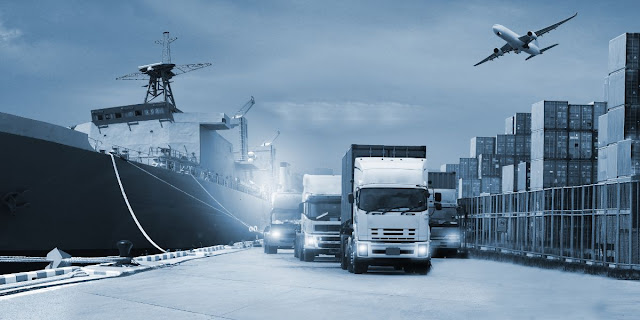Understanding the Role of Inland Transportation in Dubai to Pakistan Cargo Services
Dubai and Pakistan share a strong business relationship that
has been growing for decades. Both countries have established themselves as key
players in the global trade industry, with Dubai serving as a hub for cargo and
logistics services in the Middle East and Pakistan being a major market for
these services. In this blog, we will focus on understanding the role of inland
transportation in Dubai to Pakistan cargo services and how it plays a critical
role in the supply chain management of businesses.
Overview of Dubai to Pakistan Cargo Services
Dubai is strategically located between Europe, Asia, and
Africa, making it an ideal location for businesses to import and export goods.
It has developed a modern and efficient logistics infrastructure that includes
ports, airports, and road networks that enable it to handle large volumes of
cargo. Pakistan, on the other hand, has a rapidly growing economy with a huge
demand for imported goods, making it an attractive market for businesses
looking to expand their operations. As a result, cargo services between Dubai
and Pakistan have been on the rise.
Inland Transportation in Dubai to Pakistan Cargo Services
Inland transportation refers to the movement of goods from
one location to another within a country's borders. In the case of Dubai to
Pakistan cargo services, inland transportation plays a critical role in
ensuring that goods are transported from ports and airports to their final
destinations within Pakistan. The transportation of cargo in Pakistan is
primarily done through road, rail, and air transport.
Road Transport
Road transport is the most commonly used mode of
transportation for cargo in Pakistan. The country has a well-developed road
network that connects all major cities and towns. The National Highway Authority
(NHA) is responsible for the construction and maintenance of Pakistan's
highways and motorways. The NHA has constructed a number of major highways that
connect Pakistan's major cities, including the M-1, M-2, and M-3 motorways.
Dubai to Pakistan cargo services use trucks and trailers for
transporting goods via road. These trucks are equipped with GPS tracking
devices that allow cargo companies to monitor the movement of goods in
real-time. This enables businesses to keep track of their shipments and ensures
that goods are delivered on time.
Rail Transport
Rail transport in Pakistan is not as widely used for cargo
transport as road transport. However, it is still an important mode of
transportation, especially for heavy goods and bulk cargo. Pakistan Railways is
responsible for the operation of the country's railway system. The railway
network covers all major cities and towns and connects Pakistan to neighboring
countries such as Iran and India.
Dubai to Pakistan cargo services use rail transport for transporting
bulk cargo such as coal, cement, and fertilizer. Rail transport is often
cheaper than road transport, making it an attractive option for businesses that
need to transport large volumes of goods.
Air Transport
Air transport is the fastest mode of transportation for
cargo and is often used for transporting high-value and time-sensitive goods.
Pakistan has several international airports, including Jinnah International
Airport in Karachi, Allama Iqbal International Airport in Lahore, and Benazir
Bhutto International Airport in Islamabad.
Dubai to Pakistan cargo services use air transport for
transporting perishable goods such as fruits and vegetables, as well as
high-value goods such as electronics and pharmaceuticals. Air transport is also
used for emergency shipments, such as humanitarian aid and disaster relief
supplies.
Challenges in Inland Transportation
Inland transportation in Pakistan faces several challenges
that can impact the efficiency of cargo services. These challenges include:
- Poor
Infrastructure - Despite efforts by the government to improve the
country's infrastructure, Pakistan still faces several infrastructure
challenges, especially in rural areas. Poor road conditions and inadequate
rail infrastructure can lead to delays in cargo transport.
- Security
Concerns - Pakistan has faced several security challenges in recent years,
including terrorist attacks and political unrest. This can impact the
safety of cargo transport and result in delays and additional costs for
cargo companies.
- Customs
Clearance - Customs clearance procedures in Pakistan can be time-consuming
and bureaucratic, leading to delays in the clearance of goods at ports and
airports.
- Congestion
- The high volume of cargo transport in Pakistan can lead to congestion at
ports and airports, resulting in delays in the movement of goods.
Conclusion
Inland transportation plays a critical role in Dubai to
Pakistan cargo services. The efficient movement of goods from ports and
airports to their final destinations within Pakistan is essential for
businesses looking to expand their operations in the country. While there are
challenges in the inland transportation sector in Pakistan, the government is
making efforts to improve infrastructure and streamline customs clearance procedures
to facilitate the movement of goods. As Dubai and Pakistan continue to
strengthen their business ties, the role of inland transportation in cargo
services will only become more important in ensuring the smooth and efficient
operation of supply chains.




Thank you so much for sharing this detail article on Dubai to Pakistan Cargo. Very informative and organized perfectly. Keep up the good work
ReplyDelete